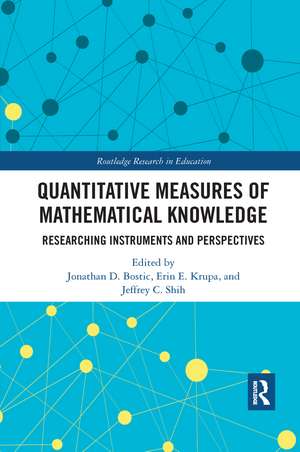Quantitative Measures of Mathematical Knowledge: Researching Instruments and Perspectives: Routledge Research in Education
Editat de Jonathan Bostic, Erin Krupa, Jeffrey Shihen Limba Engleză Paperback – 18 dec 2020
| Toate formatele și edițiile | Preț | Express |
|---|---|---|
| Paperback (1) | 384.59 lei 6-8 săpt. | |
| Taylor & Francis – 18 dec 2020 | 384.59 lei 6-8 săpt. | |
| Hardback (1) | 999.46 lei 6-8 săpt. | |
| Taylor & Francis – 7 mai 2019 | 999.46 lei 6-8 săpt. |
Din seria Routledge Research in Education
-
 Preț: 310.29 lei
Preț: 310.29 lei -
 Preț: 304.19 lei
Preț: 304.19 lei -
 Preț: 303.18 lei
Preț: 303.18 lei -
 Preț: 147.15 lei
Preț: 147.15 lei -
 Preț: 276.13 lei
Preț: 276.13 lei -
 Preț: 302.17 lei
Preț: 302.17 lei -
 Preț: 303.75 lei
Preț: 303.75 lei -
 Preț: 290.73 lei
Preț: 290.73 lei -
 Preț: 310.31 lei
Preț: 310.31 lei - 8%
 Preț: 381.60 lei
Preț: 381.60 lei -
 Preț: 304.83 lei
Preț: 304.83 lei -
 Preț: 377.85 lei
Preț: 377.85 lei -
 Preț: 401.01 lei
Preț: 401.01 lei -
 Preț: 310.65 lei
Preț: 310.65 lei -
 Preț: 303.89 lei
Preț: 303.89 lei -
 Preț: 129.83 lei
Preț: 129.83 lei -
 Preț: 310.08 lei
Preț: 310.08 lei -
 Preț: 310.22 lei
Preț: 310.22 lei -
 Preț: 294.39 lei
Preț: 294.39 lei - 8%
 Preț: 381.99 lei
Preț: 381.99 lei - 9%
 Preț: 867.43 lei
Preț: 867.43 lei - 9%
 Preț: 1003.95 lei
Preț: 1003.95 lei -
 Preț: 303.89 lei
Preț: 303.89 lei -
 Preț: 358.67 lei
Preț: 358.67 lei - 8%
 Preț: 389.47 lei
Preț: 389.47 lei - 18%
 Preț: 1060.52 lei
Preț: 1060.52 lei - 18%
 Preț: 1116.74 lei
Preț: 1116.74 lei -
 Preț: 397.75 lei
Preț: 397.75 lei - 18%
 Preț: 1221.80 lei
Preț: 1221.80 lei - 18%
 Preț: 1110.74 lei
Preț: 1110.74 lei - 18%
 Preț: 1053.92 lei
Preț: 1053.92 lei - 18%
 Preț: 1162.84 lei
Preț: 1162.84 lei - 18%
 Preț: 1063.65 lei
Preț: 1063.65 lei - 28%
 Preț: 851.82 lei
Preț: 851.82 lei - 18%
 Preț: 1054.75 lei
Preț: 1054.75 lei - 18%
 Preț: 1054.58 lei
Preț: 1054.58 lei - 18%
 Preț: 1178.85 lei
Preț: 1178.85 lei - 18%
 Preț: 1111.72 lei
Preț: 1111.72 lei - 18%
 Preț: 1057.75 lei
Preț: 1057.75 lei -
 Preț: 489.03 lei
Preț: 489.03 lei - 18%
 Preț: 1059.14 lei
Preț: 1059.14 lei - 18%
 Preț: 1050.09 lei
Preț: 1050.09 lei - 18%
 Preț: 1060.52 lei
Preț: 1060.52 lei - 18%
 Preț: 1062.98 lei
Preț: 1062.98 lei - 18%
 Preț: 1056.28 lei
Preț: 1056.28 lei - 18%
 Preț: 1217.63 lei
Preț: 1217.63 lei - 18%
 Preț: 1060.19 lei
Preț: 1060.19 lei - 18%
 Preț: 1170.84 lei
Preț: 1170.84 lei - 18%
 Preț: 1167.36 lei
Preț: 1167.36 lei
Preț: 384.59 lei
Nou
Puncte Express: 577
Preț estimativ în valută:
73.60€ • 79.92$ • 61.82£
73.60€ • 79.92$ • 61.82£
Carte tipărită la comandă
Livrare economică 23 aprilie-07 mai
Preluare comenzi: 021 569.72.76
Specificații
ISBN-13: 9780367670757
ISBN-10: 0367670755
Pagini: 266
Dimensiuni: 152 x 229 x 15 mm
Greutate: 0.34 kg
Ediția:1
Editura: Taylor & Francis
Colecția Routledge
Seria Routledge Research in Education
Locul publicării:Oxford, United Kingdom
ISBN-10: 0367670755
Pagini: 266
Dimensiuni: 152 x 229 x 15 mm
Greutate: 0.34 kg
Ediția:1
Editura: Taylor & Francis
Colecția Routledge
Seria Routledge Research in Education
Locul publicării:Oxford, United Kingdom
Public țintă
PostgraduateCuprins
- Validation in Mathematics Education: An Introduction to Quantitative Measures of Mathematical Knowledge: Researching Instruments and Perspectives – Erin E. Krupa, Jonathan Bostic, and Jeff Shih
- The Form of Mathematics in Assessment Items: How Items Convey and Measure Multiplicative Reasoning Differently – Karl W. Kosko
- Substantiating claims about students’ algebraic reasoning: Initial evidence based on response processes and internal structure – Lindsey Perry, Leanne R. Ketterlin-Geller, and Cassandra Hatfield
- A Validation Approach to Middle-grades Learning Trajectories within a Digital Learning System applied to the "Measurement of Characteristics of Circles" – Jere Confrey and Emily Toutkoushian
- Assessing college-ready data-based reasoning – Amy Arneson, Diah Wihardini, and Mark Wilson
- A Validity Argument for an Undergraduate Mathematics Concept Inventory – Kathleen Melhuish and Michael D. Hicks
- Developing a construct map for teacher attentiveness – Michele Carney, Tatia Totorica, Laurie Cavey, and Patrick R. Lowenthal
- A validation process for complex knowledge: The Standards for Mathematical Practice Konwledge-Gabriel Matney, Jonathan D. Bostic, and Mathew Lavery
- Reflecting on the past and looking ahead at opportunities in quantitative measurement of K-12 students’ content knowledge – Jonathan Bostic, Erin Krupa, Michele Carney, and Jeff Shih
- Future Directions in the Measurement of Mathematics Teachers’ Competencies – Heather Howell, Elizabeth Stone, and Michael Kane
Notă biografică
Jonathan Bostic is an associate professor of mathematics education at Bowling Green State University, USA.
Erin Krupa is an assistant professor of mathematics education at North Carolina State University, USA.
Jeffrey Shih is an associate professor of mathematics education at the University of Nevada, Las Vegas, USA.
Erin Krupa is an assistant professor of mathematics education at North Carolina State University, USA.
Jeffrey Shih is an associate professor of mathematics education at the University of Nevada, Las Vegas, USA.
Recenzii
"The authors of these ten chapters, all experts in mathematics education research, provide a broad yet unified message: increased validity and credibility are achievable via more “robust and rigorous measures in mathematics education.” Each chapter includes extensive references. This book’s audience includes mathematics education researchers, assessment specialists, and interested mathematics education students."
-J. Johnson, emeritus, Western Washington University, CHOICE
-J. Johnson, emeritus, Western Washington University, CHOICE
Descriere
Written for assessment scholars and students both in mathematics education and across educational contexts, this book presents innovative research and perspectives on quantitative measures, including their associated purpose statements and validity arguments.
